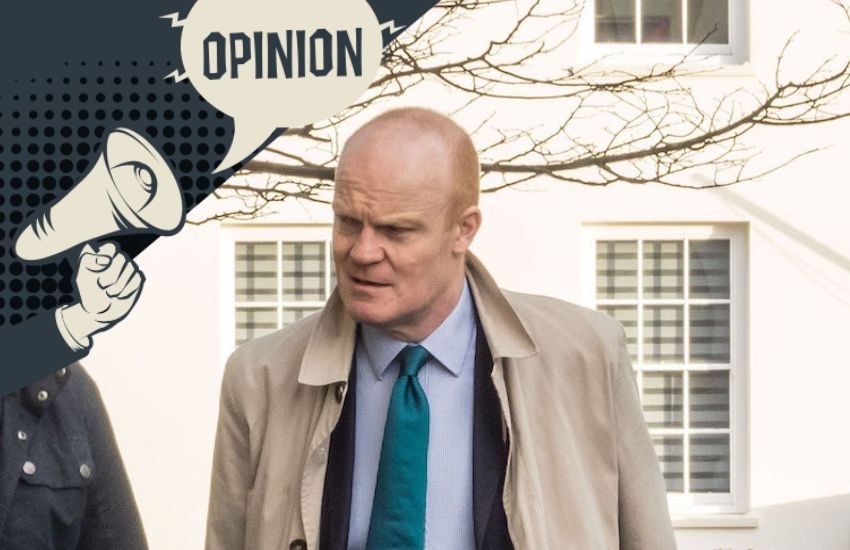


Deputy Gavin St Pier has reflected on last week's tax debate, labelling the final votes the most bizarre he has seen since becoming a People's Deputy.
“You couldn’t make this stuff up”. That is a phrase that is often used by Deputy Inder in the Assembly. I don’t recall if he used it in last week’s Tax Review debate, but never could it have been more apt.
"You may already think you know what the States decided: nothing. But it’s not as simple as that. Actually, the States voted to do quite a lot. But first, as expected, the bitter GST pill was not swallowed. Option A which contained P&R’s GST prescription, got 15 votes which was one or two more than most expected.
"P&R’s late ‘alternatives’, Options B (a lot of unpopular tax increases) and C (a lot of unpopular spending cuts) – neither of which had been in the original policy letter - proved to be as unpopular as everyone expected them to be. They were seen as crude attempts to make GST look positively attractive by comparison, rather than credible alternatives.
"The real contest was between the Fairer Alternative (Option D) and the Broom Wagon (Option E.) Option E was the last of last minute amendments presented by Deputy Roffey as a sweeper that could ensure some kind of decision was made. Deputy Soulsby summarised it as the ‘tax-and-spend’ alternative as it abandoned any attempt at expenditure restraint, other than a very weak direction to committees to ‘consider’ what efficiencies they could make. We all know exactly precisely how much that was going to save: zero. Whilst it was more popular than any of P&R’s alternatives, gaining 18 votes, it didn’t prove to be the broom wagon that Deputy Roffey hoped it would be. Revealingly and worryingly, it had the backing of all of P&R’s members, sending the message that apparently, they’d rather tax and spend than make any attempt at spending restraint.
"Option D had been structured and presented as a two-stage package. Stage 1 were the measures required over the next couple of years to deliver reform of the social security contribution system. This was to be funded by a levy on the corporate sector and some very modest expenditure restraint (amounting to 0.6% of the annual budget) together with a handful of other revenue raising measures aimed at those with the broadest shoulders. I asked if members could really leave the Assembly and look the community in the eye, saying honestly, ‘we can’t even find savings of just 0.6%'.
"Apparently, they could. Stage 2 set out a series of steps, including in-depth consideration of Deputy Parkinson’s territorial tax plan, all feeding into a fresh review and debate in June 2026, early in the next term of government. Despite some initially encouraging noises from P&R members’ Deputies Ferbrache and Murray that the amendment was credible in meetings prior to the Assembly’s sitting, by the time of the debate, P&R’s position had solidified into outright opposition. Apparently, Option D was no longer credible and contained no substantive measures. There was a considerable amount of pressure piled onto a handful of members not to support Option D. It seemed that success for Option D would not be interpreted as the States having found an acceptable consensus alternative, but rather as an unacceptable defeat for the governing coalition.
"The result? A 20-20 tied vote, which meant the proposition failed. A re-vote (ostensibly to check the accuracy of the first vote, notwithstanding that simultaneous electronic voting ought to have rendered that provision redundant) did not break the deadlock.
"So, you’d think if Stage 1 had failed to get enough votes, Option D’s Stage 2 would logically fall away too, right? Not so fast. Deputy Soulsby and I had both explained in debate that if Stage 1 did not pass, it made no sense to support Stage 2. Nonetheless substantial majorities were secured for all the Stage 2 propositions, each supported by one or members of P&R, who had only just finished telling us that Option D wasn’t credible. Even within that series of votes, there were some oddities. Deputy Murray, who has repeatedly spoken of the need for a vision for our economy, voted against a proposition that directed the development of just such a vision. Of greater concern is the resolutions direct P&R to do work, but in four cases, only a minority of P&R members supported those particular resolutions. In other words, they are being directed to do work that a majority of their members do not want to do. How credible is that?
"In my 11 years in the States, I have participated in a number of odd votes in the Assembly, but the outcome from these six days of debate spread over two meetings is, by a country mile, the most bizarre. And it is deeply concerning that it happened to be on the senior committee’s flagship policy dealing with the long-term sustainability of funding for public services – arguably, the States’ most important decision for several terms.
"To mix many well-trodden phrases: Although we were told we’d run out of road (or runway), the States having rejected, for all the wrong reasons, Stage 1 of Option D, but by then adopting Stage 2, it firmly kicked the can, presumably, beyond the end of the road (or runway). You couldn’t make this stuff up.
Deputy Murray has drawn to my attention that he in fact voted in favour, not against the development of a vision and associated economic model. I apologise unreservedly to him for my error. https://t.co/Rpfjv7giRr
— Gavin St Pier (@gavinstpier) February 23, 2023